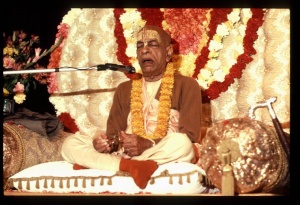CC Madhya 11.50 (1975): Difference between revisions
(Vanibot #0027: CCMirror - Mirror CC's 1996 edition to form a basis for 1975) |
(Vanibot #0020: VersionCompareLinker - added a link to the Version Compare feature) |
||
| Line 2: | Line 2: | ||
<div style="float:left">'''[[Sri Caitanya-caritamrta (1975)|Śrī Caitanya-caritāmṛta (1975)]] - [[CC Madhya (1975)|Madhya-līlā]] - [[CC Madhya 11 (1975)|Chapter 11: The Beḍā-kīrtana Pastimes of Śrī Caitanya Mahāprabhu]]'''</div> | <div style="float:left">'''[[Sri Caitanya-caritamrta (1975)|Śrī Caitanya-caritāmṛta (1975)]] - [[CC Madhya (1975)|Madhya-līlā]] - [[CC Madhya 11 (1975)|Chapter 11: The Beḍā-kīrtana Pastimes of Śrī Caitanya Mahāprabhu]]'''</div> | ||
<div style="float:right">[[File:Go-previous.png|link=CC Madhya 11.49 (1975)|Madhya-līlā 11.49]] '''[[CC Madhya 11.49 (1975)|Madhya-līlā 11.49]] - [[CC Madhya 11.51 (1975)|Madhya-līlā 11.51]]''' [[File:Go-next.png|link=CC Madhya 11.51 (1975)|Madhya-līlā 11.51]]</div> | <div style="float:right">[[File:Go-previous.png|link=CC Madhya 11.49 (1975)|Madhya-līlā 11.49]] '''[[CC Madhya 11.49 (1975)|Madhya-līlā 11.49]] - [[CC Madhya 11.51 (1975)|Madhya-līlā 11.51]]''' [[File:Go-next.png|link=CC Madhya 11.51 (1975)|Madhya-līlā 11.51]]</div> | ||
{{CompareVersions|CC|Madhya 11.50|CC 1975|CC 1996}} | |||
{{RandomImage}} | {{RandomImage}} | ||
==== TEXT 50 ==== | ==== TEXT 50 ==== | ||
<div class="verse"> | <div class="verse"> | ||
:eta | :eta śuni' sārvabhauma ha-ilā cintita | ||
:rājāra anurāga | :rājāra anurāga dekhi' ha-ilā vismita | ||
</div> | </div> | ||
| Line 18: | Line 17: | ||
<div class="synonyms"> | <div class="synonyms"> | ||
eta | eta śuni'-hearing this; sārvabhauma—Sārvabhauma; ha-ilā—became; cintita—very thoughtful; rājāra—of the King; anurāga—attachment; dekhi'—seeing; ha-ilā—became; vismita—astonished. | ||
</div> | </div> | ||
| Line 25: | Line 24: | ||
<div class="translation"> | <div class="translation"> | ||
Hearing King | Hearing King Pratāparudra's determination, Sārvabhauma Bhaṭṭācārya became thoughtful. Indeed, he was very much astonished to see the King's determination. | ||
</div> | </div> | ||
| Line 32: | Line 31: | ||
<div class="purport"> | <div class="purport"> | ||
Sārvabhauma Bhaṭṭācārya was astonished because such determination is not possible for a worldly man attached to material enjoyment. The King certainly had ample opportunity for material enjoyment, but he was thinking that his kingdom and everything else was useless if he could not see Śrī Caitanya Mahāprabhu. This is certainly sufficient cause for astonishment. In Śrīmad-Bhāgavatam it is stated that bhakti, devotional service, must be unconditional. No material impediments can actually check the advancement of devotional service, be it executed by a common man or a king. In any case, devotional service rendered to the Lord is always complete, despite the | Sārvabhauma Bhaṭṭācārya was astonished because such determination is not possible for a worldly man attached to material enjoyment. The King certainly had ample opportunity for material enjoyment, but he was thinking that his kingdom and everything else was useless if he could not see Śrī Caitanya Mahāprabhu. This is certainly sufficient cause for astonishment. In Śrīmad-Bhāgavatam it is stated that bhakti, devotional service, must be unconditional. No material impediments can actually check the advancement of devotional service, be it executed by a common man or a king. In any case, devotional service rendered to the Lord is always complete, despite the devotee's material position. Devotional service is so exalted that it can be executed by anyone in any position. One must simply be dṛḍha-vrata, firmly determined. | ||
</div> | </div> | ||
Latest revision as of 06:41, 27 January 2020

A.C. Bhaktivedanta Swami Prabhupada
TEXT 50
- eta śuni' sārvabhauma ha-ilā cintita
- rājāra anurāga dekhi' ha-ilā vismita
SYNONYMS
eta śuni'-hearing this; sārvabhauma—Sārvabhauma; ha-ilā—became; cintita—very thoughtful; rājāra—of the King; anurāga—attachment; dekhi'—seeing; ha-ilā—became; vismita—astonished.
TRANSLATION
Hearing King Pratāparudra's determination, Sārvabhauma Bhaṭṭācārya became thoughtful. Indeed, he was very much astonished to see the King's determination.
PURPORT
Sārvabhauma Bhaṭṭācārya was astonished because such determination is not possible for a worldly man attached to material enjoyment. The King certainly had ample opportunity for material enjoyment, but he was thinking that his kingdom and everything else was useless if he could not see Śrī Caitanya Mahāprabhu. This is certainly sufficient cause for astonishment. In Śrīmad-Bhāgavatam it is stated that bhakti, devotional service, must be unconditional. No material impediments can actually check the advancement of devotional service, be it executed by a common man or a king. In any case, devotional service rendered to the Lord is always complete, despite the devotee's material position. Devotional service is so exalted that it can be executed by anyone in any position. One must simply be dṛḍha-vrata, firmly determined.